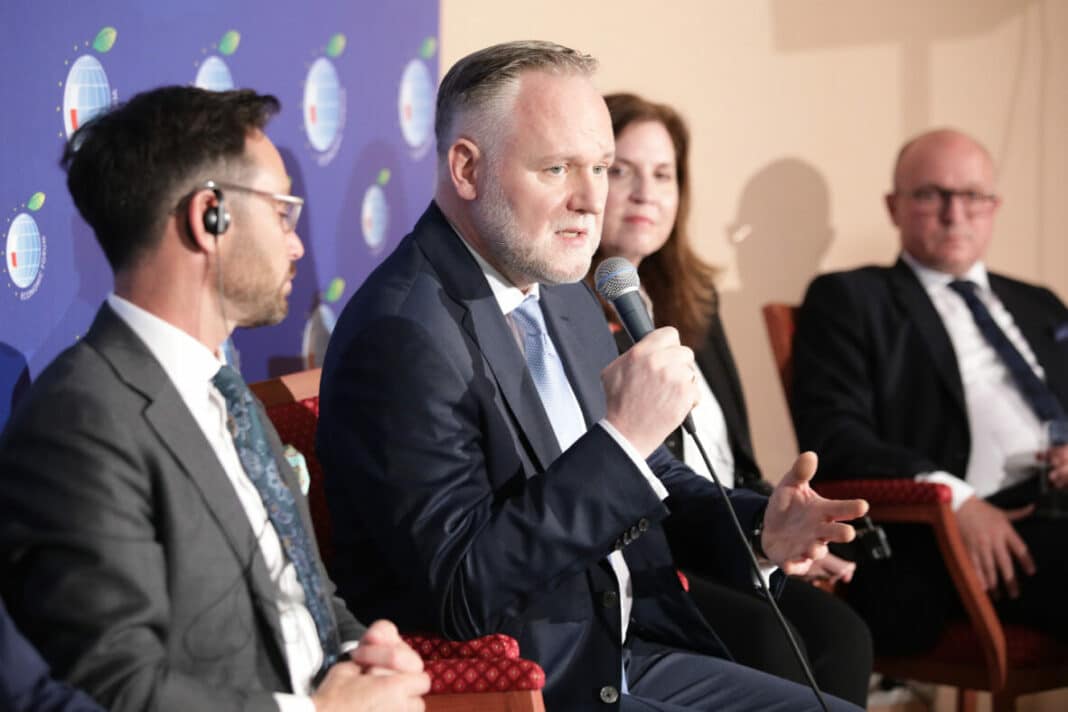Building Small Modular Reactors (SMRs) can become an important form of support for the energy transition, according to participants of a panel held during the XXXII Economic Forum in Karpacz.
Energy security, lower electricity bills, low-emission energy, additional revenues for local and state budgets – these are some of the benefits of investing in the so-called small atom, the participants said.
According to Dawid Jackiewicz, vice-president of Orlen Synthos Green Energy (OSGE), the development of nuclear technologies in Poland, both large-scale and small-scale, will be a breakthrough for the Polish economy due to a stable, zero-emission and, above all, cheap source of energy.
“In this way, we are giving a serious impulse to the whole economy and the energy-intensive industry not to leave Poland, not to look for relocation to other countries without climate standards. By building small nuclear reactors we are able to keep the industry in Poland and even increase its production,” Jackiewicz argued.
The OSGE vice-president added that investments in small nuclear plants also mean new jobs. He pointed out that during the investment period, i.e. for 6-7 years, around 2,700 people will find employment in the case of a single reactor project. In turn, during at least 60 years of its operation, there will be about 700 jobs. This is also PLN 3.2 billion of gross added value with one reactor.
“I believe that in recent decades we have rarely been able to talk about such important moments for the economy, which can so strongly stimulate its development and to such a significant extent create conditions for the development of its competitiveness,” Jackiewicz pointed out.
Wojciech Hann, an expert from KPMG, who presented the results of a report on the benefits of investing in a small atom, pointed out that the construction of one reactor for municipalities means benefits of up to PLN 12 million per year.
“If we are talking about the investment phase for the construction of 4 or 10 reactors, we can also generate billions of zlotys over a period of 60 years of their operation,” Hann added.
According to Lucjusz Nadbereżny, president of Stalowa Wola, where one of the small nuclear reactors is to be built, this is a great opportunity for the city and the entire region, as it will help realise a new economic zone of 1,000 hectares dedicated to investors in industries requiring high-powered, stable and zero-emission electricity.
Heat makers
According to a report by the Polish Economic Institute (PIE), as well as producing energy for industry, SMRs’ greatest potential may lie in the production of system heat in the largest Polish agglomerations.
According to experts surveyed by the PIE, apart from producing electricity for industry, one of SMRs’ key roles will be producing system heat. According to 50% of the experts, SMRs will be used for this purpose before 2040. Meanwhile, 77% of the experts believe that they could even meet over 20% of demand for district heat in large urban agglomerations in the future.
Poland remains one of the EU countries with the most developed district heating system. More than 40% of the 13.5 million households in Poland are connected to the heating network. It is also responsible for around a quarter of all the heat generated (including in industry).
Of the 53.5 GW of installed capacity in heating networks, coal remains the key fuel (71% of total fuel consumption; around 14.5 million tons per year).
One of the cities that could benefit significantly from the use of SMRs in the decarbonization of heating is Warsaw. In 2020, demand for system heat in the Polish capital amounted to 8.9 TWh; of this, 90.7% was produced by heating plants that use hard coal.
In the future, the demand for heating in Warsaw could even exceed 14 TWh. Installing three reactors with a capacity of 900 MWt (300 MWe) in the network could meet up to 81% of Warsaw’s annual heating demand in 2040 in the cogeneration model, while boosting electricity production in the months when demand for heating falls, the report notes.
Public support for using the latest nuclear technologies to generate electricity in Poland is at 84%, the highest result among the countries surveyed. This is 15% higher than in France and Sweden (69% support) and 23% higher than in the US.
Orlen Synthos Green Energy to get US financing
Orlen Synthos Green Energy (OSGE) will receive financing from the US Department of State to accelerate the project to build small nuclear reactors in Poland, John Kerry, the US President’s special envoy for climate, announced in September.
As Kerry explained during the Three Seas Initiative Summit in Bucharest, support will come from the US “Phoenix” project, which aims to support the development of SMRs in Central Europe, in particular projects to build small nuclear reactors in locations related to conventional energy.
Poland, the Czech Republic and Slovakia will receive funds under the program. The SMR technology implemented by OSGE in Poland is BWRX-300 developed by GE Hitachi Nuclear Energy. Kerry did not provide support amounts. “Phoenix” will finance the preparation of project feasibility studies.
“The decision of the US authorities to co-finance the program for the construction of ORLEN Synthos Green Energy small nuclear reactors from the Phoenix project will contribute to the development of Polish-American technological cooperation and strengthen the country’s energy security. The growing coalition of partners supporting our program proves it has a strong business foundation. Obtaining additional funds will facilitate the effective implementation of this innovative project, the goal of which is clean and affordable energy for our customers,” said Daniel Obajtek, President of the Management Board of Orlen.


